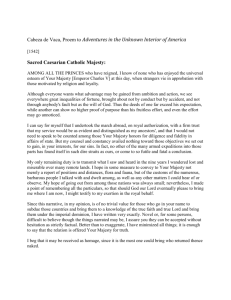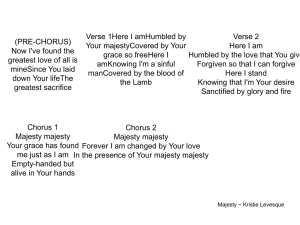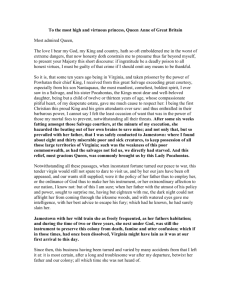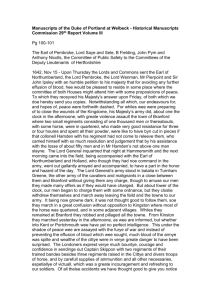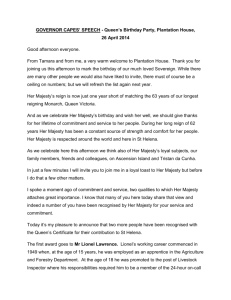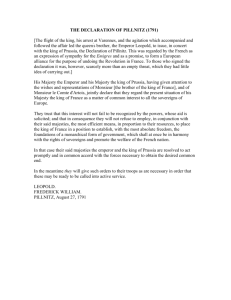The march through the pass Hsbt 23 tp(y) Smw sw 19 rs m anx Year
advertisement
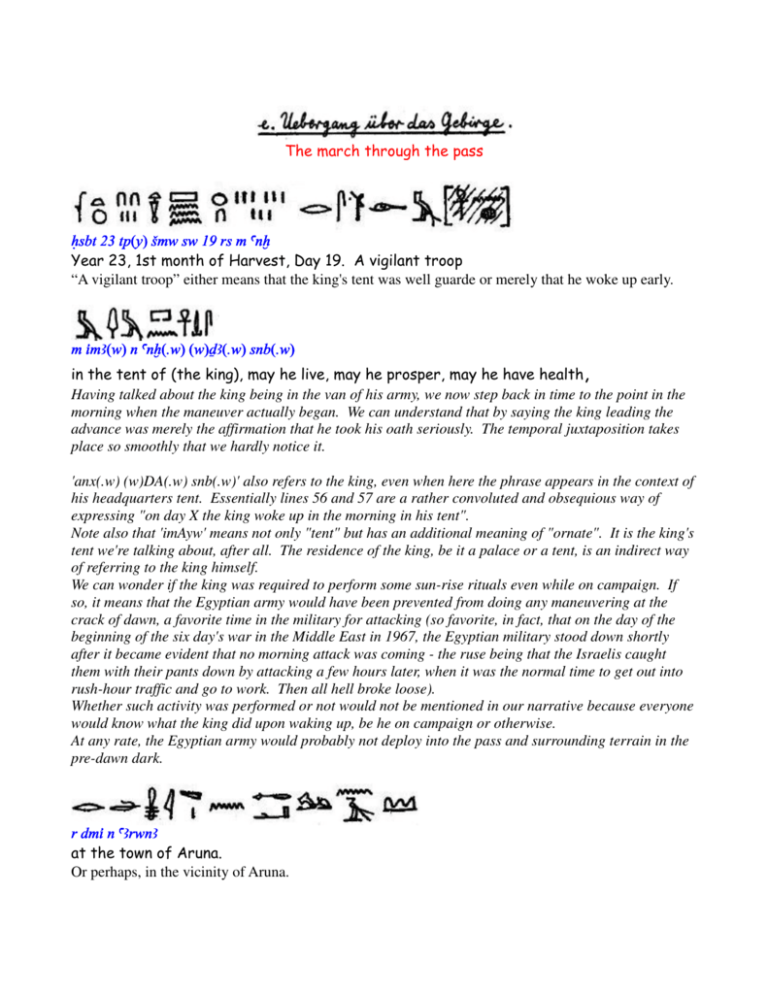
The march through the pass
Hsbt 23 tp(y) Smw sw 19 rs m anx
Year 23, 1st month of Harvest, Day 19. A vigilant troop
“A vigilant troop” either means that the king's tent was well guarde or merely that he woke up early.
m imA(w) n anx(.w) (w)DA(.w) snb(.w)
in the tent of (the king), may he live, may he prosper, may he have health,
Having talked about the king being in the van of his army, we now step back in time to the point in the
morning when the maneuver actually began. We can understand that by saying the king leading the
advance was merely the affirmation that he took his oath seriously. The temporal juxtaposition takes
place so smoothly that we hardly notice it.
'anx(.w) (w)DA(.w) snb(.w)' also refers to the king, even when here the phrase appears in the context of
his headquarters tent. Essentially lines 56 and 57 are a rather convoluted and obsequious way of
expressing "on day X the king woke up in the morning in his tent".
Note also that 'imAyw' means not only "tent" but has an additional meaning of "ornate". It is the king's
tent we're talking about, after all. The residence of the king, be it a palace or a tent, is an indirect way
of referring to the king himself.
We can wonder if the king was required to perform some sun-rise rituals even while on campaign. If
so, it means that the Egyptian army would have been prevented from doing any maneuvering at the
crack of dawn, a favorite time in the military for attacking (so favorite, in fact, that on the day of the
beginning of the six day's war in the Middle East in 1967, the Egyptian military stood down shortly
after it became evident that no morning attack was coming - the ruse being that the Israelis caught
them with their pants down by attacking a few hours later, when it was the normal time to get out into
rush-hour traffic and go to work. Then all hell broke loose).
Whether such activity was performed or not would not be mentioned in our narrative because everyone
would know what the king did upon waking up, be he on campaign or otherwise.
At any rate, the Egyptian army would probably not deploy into the pass and surrounding terrain in the
pre-dawn dark.
r dmi n aArwnA
at the town of Aruna.
Or perhaps, in the vicinity of Aruna.
wDyt
The departure
f) Compare line 310.
d-e) Restored in the 19th Dynasty. The M17 is much smaller than the preceding M17 in 'it.f', so
its probability is less certain, either “Amun, Lord of the Thrones of the Two Lands” or just
“Amun”
m xd in Hm.i Xr it(.i) imn-ra nb xaw tAwy
is northward by My Majesty under (the protection of) my father Amun-Ra, Lord of the
Thrones of the Two Lands,
wp.f wawt
may he open the roads (or he opens the roads - see below)
A prospective here has problems unless it's a direct copy out of the army's journal. This restoration of
Sethe's does not match the parallel constructions which follow:
imn-ra nb xaw tAwy wp.f wAwt r-hAt.i
as opposed to the following:
ra-Hr-Axty Hr smnt ib n msA.i n nxwt
it(.i) imn Hr snxt xps Hm.i
Dhwty Hr stp-sA Hr Hm.f
The basic construction form of the last three lines is: god + Hr + infinitive + additional remarks.
There is certainly room, indeed it fits nicely, to emend as follows: Hr wpt wAwt.
Additionally, it makes more sense in the present context for Amun-Ra to be actively "opening the road"
in front of the king on this “dangerous” advance and thus actively participating in the events rather
than suddenly, at this juncture, praying that he do so. However, I think this is what made Nelson think
that there was an image of the god preceding the advance. That doesn't necessarily have to happen for
the god to be effective in this manner.
ra-xr-Axty Hr smnt ib n msA.i n nxwt
and Ra-Hor-Akhty who emboldens my army,
a-b was restored incorrectly in the 19th Dynasty as 'imn nb nswt tAwy'
it(.i) i Hr snxt xp Hm.i
and my father Amun above, who strengthens My Majesty's sword
...
... Dhwt
Dhwt Hr
Hr stp-sA
stp-sA
... Djehuty (Thoth) who is a protector
Hr Hm.i
over my Majesty.
The king finds the exit of the pass is empty because the enemy is expecting him
on lthe Taanach road. He sees that he has (already) won a victory and calls upon
his army to give thanks to Amun.
So the king found that the pass was clear. Why would anyone be surprised at this? That was surely the
report that was given to him at the meeting.
p i Hm.f Xr-HAt mSa.f
The advance of His Majesty who is in the van of his army
A noun phrase acting like a heading for a chapter or a section.
ss(p)d(w)
which is well furnished
m skw aSaw
with troops.
n gm.n.f xrw wa
He could not find a single one of the vile (enemy)
pA(y).sn
because their
dbw rs(w) m tA-aA-nA-kA
southern wing was at Taanach.
Instead of wings, as we think of military formations, the Egyptians thought of them as horns, evoking a
much more dangerous animal. The word here is clearly plural.
iw pA(y).sn
In fact, their
db(w) mHty(w) m oaH rs(y)
northern wing was in
n tA int oyn
the southern bend of the Qina Valley.
aHa.n
Then
Hm.f Hr n r. Hr mT pn
His Majesty called (a conference) about it upon this road
XXXX
DW
Hi Bob, Hi, Dany,
Urk.IV-652
Line 13
Hsbt 23 tpi Smw sw 19 rs m anx m iAm n anx(w) (w)DA(w) s(nbw)
Regnal year 23, 1st month of the Harvest season, day 19, watchful and alive in the tent of (His Majesty)
l.p.h.
Line 14
r dmi n aA-rw-nA
at the town of Aruna
Line 15
wDyt m xd in Hm.i Xr it.i imn-ra nb nswt tAwy
military campaign northwards by My Majesty under my father (could we say: "under the auspices of
my father") Amun-Ra, Lord of the Thrones of the 2 Lands
Sure could.
Line 16
wp.f w(A)wt r-HAt.i
may he opens the roads before me
Urk.IV-653
Line 1
Hr-Axty Hr smnt ib n mSa.i n nxt
Harakhti to fortify the heart of my army to victory
Line 2
it(.i) imn Hr snxt xpS Hm.i
(my) father Amun to make strongMy Majesty's arm
Line 3
(sorry, unable to translate!)
Line 8
prt in Hm.f Xr-HAt mSa.f
His Majesty going at the head of his army
Line 9
sspd m skw aSA
made ready in many battalions
Line 10
n gm.n.f xr wa
he didn't find a single enemy
Line 11
pA(y).sn dbw rsy m tA-aA-nA-ky
their southern wing was in Taanach
Line 12
iw pA(y).sn dbw mHty m qaH rsy
their northern wing was in the south corner
Line 13
n tA int qyn
of the Qyn valley
Line 14
aHa.n Hm.f Hr nis r.s(t) Hr mTn pn
then His Majesty called them upon this road
XXXX
Hi, Bob! Hi, Rob!
I used to think computers were a god send, but after all the trouble I've had trying to put this
assignment together, I now know they are from the other place.
Rob F.
Meggido 8 - Crossing the mountains
m tp mSaw. f
56. m tp mSaw. f 23 tpy Smw sw 19 rs m anx ???
At the head of his armies year 23, first month of summer, day 19, the sentries guarding the POW's are
living in tents ???
Good try, but I'm not sure where you got the prisoners from.
57. m imAw anx mn.s r dmi n aArwnw wDyt???
and the remainder are living in the town of Aruna.The expedition????
58. m xd in Hm xr it.f (imn ra nb nswt tAwy wp.f wAwt)
downstream by his majesty by means of his father ( Amun Ra, The Lord,of the thrones of the 2 lands
He who opens the ways)
59.r HAt ra Hr Axty Hr s(mnt ib n mSa.i n nxwt)
to my front, Ra-Horahkty, encouraging my army to victories
60.(i)t.f (imn{Hr s}nxt xpS Hm.......DHwty Hr stp sA}?????
his father Amun, nurturing the victorious force of his majesty......Thoth before the royal escort????
61. prt in Hm.f Hry HAt Hm mSa.}f ssp(i) ????
The king went forth before his army and readied his army ????
62.m skw aSA n gm.n.f xrw wai pA.sn ?????
because many troops did not find this to be a single battle. Those ????
63.dbw rsy m tA aA nAky iw pA.sn
on the southern flank at Taanaky. Those ???
64. db mHty m qaH rsy n int qyn wAt aHa.n
on the northern flank bend south to here, the valley of the Qyn road, then
65.Hm.f Hr nis r.s Hr m rdi.Tn wAt pn
His Majesty summoning the sentries to the road before (him), ............
OK, Rob, you're having some troubles. You'll be able to work through them. We've all been there,
well, at least I've been there, still am on many occasions. Just compare with the other entries and you'll
be able to see what's going on. You'll get it.
XXXX
Hi, Bob,
thanks for letting me participate in the group.
That text is definitely more difficult than Sinuhe, and we were
very spoilt by Jenny Carrington's nicely printed hieroglyphs.
But God thanks I am used to bad handwriting:
My students' math exams looked similar to Sethe's text ;-).
Also, the chunks to translate are larger than in Sinuhe or Qadesh...
Noo, I am not complaining, just realizing that my childhood days in Glyph Study are
over and things become more like the real thing.
I like it.
Have a nice week! You, too, Angelika. And we're happy you've been able to join us. I'm very glad
you like it.
_____________________________________________________
Angelika
See remark 0.
Transliteration:
(56) rnpt Hsp 23 tpy Smw sw 19 rs m anx (57) m jmAw n anx wDA snb
r dmj n(j) aArwnA
wDyt (58) m xd jn Hm.j Xr jtj jmn-ra nb nswt tAwj
wp.f wAwt (59) r HAt.j
ra-Hrw-Axty Hr smnt jb n mSa.j n(j) nxt
(60) jt(j) jmn Hr snxt xpS Hm.j
…DHwtj Hr stp-sA (61) Hr Hm.j
prt jn Hm.f Xr HAt mSa.f
sspd (62) m skw aSA
nj gm.n.f xrw wa
pAy.sn (63) dbw rsw m tAaAanaky
jw pAy.sn dbw (64) mHty m qaH rsy
n tA jnt qn
aHa.n (65) Hm.f Hr njs r.s Hr mTn pn (see remark 12)
Analysis:
(56)
rnpt Hsb 23: regnal year 23
tpy: first month (Allen § 9.8 p. 107)
tpy Smw: first month of the Harvest Season
sw 19: day 19
rs: wake (2-lit)
rs: awakening (infinitive)
m anx: in life (in a good spirit) (prep. phrase)
(57)
m jmAw: in the tent (prep. phrase)
n anx wDA snb: may (he) live, prosper and be healthy (LPH)
dmj: quai, harbour, village, town
r dmj: at the village
aArwnA: Aruna (toponym), see remark 1)
wDyt: military campaign (Allen dictionary p. 459)
(58)
m xd: downstream (north)
wDyt m xd jn Hm.j: campaign downstream by My Majesty (subjunctive)
Xr jtj jmn-ra nb nswt tAwj: under the father Amun-Re, lord of the Two Lands’ thrones (see remark 2-6)
wpj: open (2ae-inf)
wAt: way, path
wp.f wAwt: that he may open the ways (subjunctive)
(59)
r HAt.j: in front of me (compound preposition + suffix 1S)
ra-Hrw-Axty: Re-Harakhti (Re+Horus+epithet of Horus)
smn: make firm (2-lit. caus.)
smn jb: fortify the heart (Faulkner Dictionary p. 228)
Hr smnt jb: upon fortifying the heart (Faulkner Dictionary p. 228)
n mSa.j: of my army (indirect genitive)
nj nxt: the strong one (adjectival phrase)
(60)
snxt: strengthen (caus.)
Hr snxt: upon strengthening
xpS: foreleg, arm
stp-sA: protect, do escort duty
see remark 7
(61)
prt jn Hm.f: Going forth of His Majesty (narrative infinitive)
Xr HAt: at the front of (compound preposition, Allen § 8.3.1 p. 89 )
sspd: make ready, prepare (3-lit caus.) (Faulkner Dictionary p. 245)
sspd: being organized... (unmarked adverb clause)
(62)
skw: troops, companies) (Faulkner Dictionary p. 251)
aSA: numerous, many, plentyful (Dickson p. 30)
gmj: find (3ae-inf)
xrw: enemy
wa: unique, sole (Vygus p. 631)
pAy.sn: their (pA(y) + suffix 3P, Allen § 5.10.5 p. 56 )
(63)
db: horn (of animal), wing (of army)) (Faulkner Dictionary p. 311)
rsy: (be) southern, south of, south (Dickson p. 126)
dbw rsw: south wing of the army (see remark 10)
tAaAanaky: Taanach (see remark 9)
(64)
mHty: (be) northern (Dickson p. 253)
qaH: elbow, arm, shoulder, corner, bend of stream (Faulkner Dictionary p. 276)
m qaH rsy: at the south bend
jnt: valley (Dickson p. 117)
tA jnt: land of the valley, valley
qn: Qina (Hannig p. 1193, entry [42632], see remark 11)
(65)
njs: summon
Hr njs: upon summoning (pseudoverbal construction)
r.s: towards it (prepositional phrase)
Hr mTn pn: on this path
Translation (lit. in brackets [...]):
[Regnal year 23, first month of the Harvest Season, day 19: Awakening in life in the tent (LPH)
at the town of Aruna.
Campaign downstream by My Majesty, under the father Amun-Re, Lord of the Two Lands’ Thrones
that he may open the ways in front of me,
Re-Harakhti upon fortifying the heart of my army, the strong one,
Father Amun upon strengthening the arm of My Majesty,
... Toth upon protecting over My Majesty.
Going forth of His Majesty at the front of his army,
being organized in numerous companies, (see remark 8)
he did not find a sole enemy,
since their south wing of the army was in Taanach.
Their north wing was at the south bend
of the Qina valley.
Then His Majesty upon summoning towards it (them) on this road ]
Regnal year 23, first month of the Harvest Season, day 19: Awakening in good spirits in the tent (LPH)
at the town of Aruna.
My Majesty marches downstream (north), under the (banner of) father Amun-Re, Lord of the Two
Lands’ Thrones
that he (Amun-Re) may open the ways in front of me,
Re-Harakhti will fortify the heart of my army, the strong one,
Father Amun will strengthen the arm of My Majesty,
... Toth will protect My Majesty.
His Majesty proceeds at the front of his army,
being organized in numerous companies, (see remark 8)
(but) he did not find a sole enemy,
since their (the enemies') south wing of the army was in Taanach.
Their north wing was at the south bend
of the Qina valley.
Then His Majesty called everybody on this road
Remarks:
0.
The headline translates: "Crossing the mountain."
1.
On "Regnal year 23, first month of the Harvest Season, day 16" (Collation Meggido 04)
the war council took place in Yehem.
On "Regnal year 23, first month of the Harvest Season, day 19", so they are in Aruna 4 days later
(including both the 16 and 19).
Yeah. Almost certainly pausing to regroup, bring up any supplies, and reconnoiter the area.
From Junkkaala, E.: Three Conquests of Canaan... (2006) p. 73:
"Yaham is probably Khirbet Yamma located on the Sharon Plain close
to the Hill Country, south of Mount Carmel, 120 km north of Gaza."
and it has the coordinates (32°22'1" N; 35°1'50" E)
http://de.getamap.net/karten/israel/hamerkaz/_khirbetyamma/
(Bob's great maps don't identify Yemma precisely.)
Anyhow, I Google-Map-ed these coordinates, and then I used the Route planner of Google Maps
to Ar'ara, which is Aruna, chose as medium of travel: "Hiking" and got a surprise:
It takes 4.5 hours for a single hiker to cover that distance, and it is 22 km long (13.75 miles).
If we do not count day 16 (it might have been used for packing) and day 19 (since the pharaoh just
woke up),
it took the army 2 days to do the 22 km, i.e. 11 km per day.
Well, from Yehem the army had to go "horse by horse" (Collation Meggido 07)
so I thought the terrain must have been difficult.
But what I see from Nelson's pictures, these are not mountains, these are hills. Also, that road is not
so narrow that one stubborn mule got everybody stuck.
Am I totally off track with my calculations, or what took them that long?
Right. It's a great question. Those are hills as you say, not mountains, and I've said before (probably
before you joined us) that the pass ain't all that narrow and wasn't in those days.
But as for travel, well, first of all, the route planner is probably basing its calculations on the present
day in which there is a paved highway going right through the pass. We can safely assume that there
was no paving in Djehutymes' time. Next, a route planner is not planning to move an entire army
through there. Coordinating that movement takes some time as well. You just can't get a few thousand
guys to route-step right along. You mentioned a stubborn mule. There were draft animals and they
definitely travel slower than a hiker. There are breakdowns of carts, etc. Plus, your hiker is probably
not advancing under arms. Carrying a shield and a few weapons after while gets tiring. I know. Well,
not so such about the shield part. There is also camping equipment and other paraphernalia. So troops
will require more breaks than a hiker. Moving with animals especially, it's probably a real good idea to
take a half hour break every two hours, just to get everyone rested and everyone back with his proper
unit and all the animals watered, etc. And there are breaks for meals, urination, etc. Keep in mind that
although the pass has been reconnoitered and found to be clear of hostiles, there is always the nasty
possibility of a surprise, so at least some troops will probably be moving battle-ready, just as a
precaution. You have to keep in mind that the region is hostile. Any civilians you find you might find
unpleasant. All that slows you down even more.
2.
Concerning jt.f or jtj:
I had a problem with the translation "My Majesty under his Father", since,
as Faulkner (The Battle of Megiddo) writes in his remark p on p. 7:
"The whole of this passage is exceptionally written in the first person, as if it were a literal
transcript of an actual piece of dictation by the king."
So, the I9 glyph must be the determinative of jtj=father, see Allen note 1 in § 7.8.1, p. 73, bottom.
3.
Concerning Xr jtj:
Faulkner (The Battle of Megiddo) has something interesting to say (remark p on p. 7):
"Hr here is a little difficult to translate. It may perhaps mean 'under' in a literal sense,
since the ram's-head of Amun on its pole will have towered over the following Pharaoh;
we too speak of marching to battle 'under the banner of freedom' and so forth, and I have taken
the word in that sense here."
I too.
Yes, Nelson thought so, too. I think it's a maybe.
4.
Sethe's remark f) concerning the word jtj (p. IV 652 of the Sethe text):
is a remark to himself and completely useless to us.
It says "Vgl. S. 310" (see p. 310).
And what is on p. 310? In the last line there is another jt.f and the remark there says:
"X1 (t) unvollständig getilgt" (X1 incompletely eliminated).
(Wonder if ink eraser had already been invented when Sethe wrote his Urkunden. Probably not!)
5.
Sethe's remark concerning the darkened passage, marked by d-e:
is technical and does not concern us:
"Unter der 19. Dynastie hergestellt. Das M17 ist sehr viel kleiner als das M17 des alten jtj,
also stand wohl einst weniger da, etwa nur jmn nb ... oder nur jmn" (The M17 is very much smaller
than the
M17 of the old jtj, i.e. was probably originally less present (huh? does he mean less visible?),
maybe only jmn nb... or only jmn)
It must be a note to himself, because even his German is odd. (Either something is present or not.
"Less present"
in my understanding is as impossible as "a little bit pregnant"!) Maybe like in the early stages of
pregnancy it means “not showing so much”.
6.
An odd spelling of jmn-ra nb nswt tAwj. But I found it in Allen Essay 15, p. 187.
7.
The headline reads:
"The king finds the exit of the pass unoccupied, since the enemy expects him coming from Ta'anuk.
He considers the victory gained and asks his people to thank Amun."
8.
If the troops were already organized in numerous companies, the pharaoh would have been stupid
to take man and mouse on the narrow road and not to send at least some delegations of spies to
Megiddo via the north and south route, like Bob suggests (I read it, but I forgot where it was.)
But I wonder, why it is not mentioned in the Annals. I think it's because a) they're concentrating on the
king and b) I think it's edited.
9.
I assume, that is Taanach!
I have no idea how to transliterate that town. If anybody has a source, would you mind letting me
know?
I am so disappointed in Hannig, for most toponyms in this text the book is useless. There is supposed to
be
a list of the localities of all of Thutmosis III campaigns to Israel and Syria, but I cannot find it, nor do
I know the title. If anybody has a hint what that could be I would be grateful for the information.
Taanach works.
10.
dbw is plural in the hieroglyphic text. I assume, that it is plural, because an army wing consists of a
bunch
of soldiers. So I set rsw also plural, because in this case it is an adjective.
11.
Hannig: "heute: Wadi es-Sitt, eine Örtlichkeit in Syrien-Palästina".
"Eine Örtlichkeit" ... hm - soso! I wish there was a dictionary with all the toponyms of Egypt, Israel
and Syria with
the historic locations expressed in (E,N) coordinates (or similar), and if the locations are not sure, with
+/- error values or
alternatives.
12.
Should it not be aHa.n Hm.f Hr njs r.sn..., or is there some grammatical
whatnot involved I don't know about (or is my translation off track?)
XXXX
Megiddo, Section 8, FScaravilli
56) HAt-sp 23 tpj Smw 19 rs m [anx]
Year 23, first of Harvest 19 awakening in life
rs: I make it an infinitive in narrative; Lichtheim's translation seems to agree
57) m iAm(w) n (Hm.f) anx(.w) wDA(.w) snb(.w)
in the tent for (his I.) kph
r dmi n aArnA wDyt
in the vicinity of Aarna. An expedition
wDyt: a noun.
58) m xd in Hm.i Xr it imn nb nswt tAwy wp.f wAwt
to the North by my I. under father Amun, Lord of the Thrones of the Two Lands, may he open the ways
in: with N17, A27 and N35; a less frequent spelling for in; see Gardiner, para 168. It refers to m xd,
which is an infinitive, in masculine form, in place of feminine, as per Gardiner (para 299, page 224, see
under sae-inf verbs)
wp.f: subjunctive to express wish.
59) r-HAt.i Hr axty Hr smnt ib n mSa.i n nxt
in front of me, whilst Horus-Harakti may fortify the heart of my army of strength
Hr-axty: or Horus of the Horizon, see N19 in Gardiner, page 487
Hr smnt: the first of a series of Hr + infinitive. As this construction expresses concomitant action, I
interpret them as having the value of subjunctives.
60) it imn Hr snxt xpS Hm.i Hr Hr stp-sA
and father Amun (may) increase the strength of my incarnation and Horus (may) protect
61) Hr Hm.i
my I.
stp-sA Hr.f: protect someone; see Faulkner page 254.
61) prt in Hm.f Xr-HAt mSa.f sspd
His I. went in front of his army, supplied
sspd: a perfective passive participle.
62) m skw aSA n gm.n.f xr pA.sn
with many troops, without finding any enemy. Their
n gm.n.f: negated perfect in adverb clause, as per Allen (18.15)
pA.sn: normally it should be pAy.sn; however, Gardiner states that 'Forms without y are sometimes
found and quotes pA.s (her) in Urk IV, 1067.
63) db rsw m tAaAnAk iw pA.sn
southern wing (was) in Taanak, whilst their
db: the presence of A1 following db probably signifies that the wing is made on men.
64) db mHty m qaH rsw
northern wing (was) in the southern arm
n tA int qni aHa.n
of the Qina Valley. Then
int: not found in Faulkner; in Vygus (page 832), with K1, N35, X1 and N18; also N25 (like in our text)
replacing N18; at page 986, with M17, K1, N35 and N25 (like in our text, but and additional fish (K3)
between N35 and N25; finally, at page 922, with our exact spelling.
65) Hm.f Hr nis r.s(n) Hr mTn pn
his I. called to them over this road.
r.s(n): unusual spelling for ME, perhaps not so in LE.
XXXX
Megiddo 08
Rhio
56 (cont). HAt-sp 23 tpy Smw 19 rswt m [anx]
Regnal year 23, first month of summer, day 19, awakening in life
57. m imAw lph= anx(w) (w)DA(w) s(nbw) r dmi n aArwnA wD[yt]
in the king’s tent l.p.h. at the town of Aruna. Expedition
imAw - tent, hut
dmi - town, village
wDyt - campaign, expedition, journey
58. m xd in Hm.i Xr it [imn ra nb nswt tAw wpi.f wAt]
northward by my majesty under my father Amun-ra, lord of Thrones and the Two Lands, he opens the
roads
m xd - northward
wpi - open, open up Vygus p. 393
NOTE: Shifts to first person. Lichtheim speculates that the original was a first person campaign diary,
later formalized into a third person narrative.
59. r HAt.i ra Hr Axty Hr sn mnt ib n mSa nsw n nxt
before me. Re Horakhty before them, the mighty army of his majesty is content
ra HR Axty - Re Horakhty
mnt - be content, happy state of being
60. it [imn Hr sn] nxt xpS Hm.i … … G7 [Hr stp sA]
(my) father Amun on account of them makes strong the arm of my majesty. … palace
G7 can serve as determinative for Imn or nsw or as pronoun 1st person sing. .i “I” or with the chick .wi
“me” see Gardiner p. 468 Both Breasted and Lichtheim omit this bit.
stp sA - palace
61. Hr Hm.i prt in [Hm.f] Xr HAt mSa.f ss[pd]
of my majesty. Coming out by his majesty before his army,
prt - Faulkner has this spelling as “ritual procession” but it is actually the infinitive of pri - to go or
come out.
in - prep. by
Xr HAt - before, at the head of etc.
sspd - prepare, make ready, to supply - with m
62. m skw aSA n gmi.n.f xr xrw] waty [pAy.sn]
making ready with (his) many troops, he did not meet with a single enemy, their
skw - troops, companies (Vy 1750)
aSA - many, numerous, (Vy 6920)
waty - single (Vy 1818)
63. dbw rsy m tAaAnAk [iw pAy.sn]
southern wing was in Taanach, their
db - wing of army
rsy - southern
Taanach - Breasted and Lichtheimer spelling
NOTE: Just before line 63, under the hatching is what appears to pA sn, just before line 64 the same
appears, prefixed by iw. pA is actually an abbreviation of the possessive article pAy. This is a nisba that
takes personal suffixes. Not all that common in ME, normal in LE. See Hoch §132. Took me a bit to
figure this out!
64. db mHty m qaH mHty [rsy[sic] [n tA int qyn [aHa.n]
northern wing on the northern tract (side) of the valley of Qina (Kina). Then
rsy - in this sentence Lichtheimer says Sethe’s use of southern is “impossible” and should be “north” or
the use of “Qina valley” should be questioned.
int - valley
Qina - Used Lichtheims spelling. Breasted uses Kina. I could not find a source to verify the
hieroglyphic spelling of Qina.
65. Hm.f Hr nis rs Hr m nis r n Hr m [Tn pn]
his majesty called to them on this road,
XXXX
VHP
Hsbt 23 tpy Smw sw 19 rs m anx m jmAw a-w-s r dmj aA-rw-nA
Regnal year 23, 1 Shemu 19, awakening in life in the tent of (HM) l.p.h. near the town of Aruna
Nelson thinks that rs m anx might refer to the king's bodyguard, and quotes a similar passage from the
Kadesh poem. Hannig, however, believes that this is a standard phrase in military bulletins marking the
dawning of a new day. If we take rs(w) as a noun, meaning "watch", rather than the infinitive of the
verb meaning "to wake up", however, it makes little grammatical sense, so I tend to support the view
of Hannig.
wDyt m xd jn Hm=j Xr jt[f] jmn ra nb nswt tAwy wp=f wAt r hAt=j
A northward advance by myself bearing (the image of my) father Amun-Ra, lord of the thrones of the
two lands, so that he might open the way before me,
Nelson reports that it was not unusual for military expeditions to carry a portable shrine with them for
its apotropaic properties. Lichtheim hedges her bets by translating "with my father", Breasted says
"under the protection of my father" which rather stretches the meaning of Xr. wp=f is a subjunctive of
purpose.
Hr-Axty Hr smnt jb n mSa=j n nxt
with Herakhty buoying up the spirits of my valiant army,
It is not clear whether Hr-Axty refers to another image. Hr smnt jb lit. "making firm the heart".
jt[f]=j jmn Hr snxt xpS Hm=j DHwty Hr stp-sA Hr Hm=j
my father Amun strengthening the arm of my Majesty and Thoth watching over my Majesty
stp-sA has a number of meanings, including "watch" (of guards) and "palace".
prt jn Hm=f Xr-HAt mSa=f sspd(w) m skw aSAw
HM comes forth ahead of his army which is arrayed in several battalions,
We are now back to the third person. Lichtheim suggests that these switches in person may be due to a
first person narrative having been somewhat hurriedly converted to the third person, maybe for
purposes of "publication" In this case I think the prt is literal, Tuthmose exits first from the defile.
sspd(w) passive ptcple. lit."which has been prepared".
nj gm.n=f xrw wa pA(y)=sn db rsy m tA-aA-nA-ky
but cannot find a single enemy, for their southern wing is in Taanach
Here Nelson disagrees violently with Sethe's restoration - nj gm.n=f xrw wa - and one can see why, as
it seems to be plucked out of thin air. But Sethe is so sure of his ground that he even says in his heading
that the King finds the exit from the pass unoccupied. At least his suggestion is logical, if improbable,
since the bulk of the hostile army were some way off in the south and the northern wing concealed by
the bank of the Qina brook, as we now learn. I have preserved the historic present as suggested by nj
gm.n=f, which does not refer to the past.
I'm not following this. As far as I can tell, Sethe says the pass is clear. Which is true if the enemy
forces are elsewhere, like Taanach and the Qina Brook. I'm not sure where you got the idea that the
troops at the Qina were concealed, or how they would have been concealed.
pA(y)=sn db mHty m qaH rsy n tA jnt qjn
and their northern wing on the southern side of the Qina valley
Lichtheim argues that qaH rsy must be wrong, because if the enemy were to the south of the Qina
brook the Egyptian troops would not have been able to emerge from the defile unseen, so it should read
qaH mHty.
As far as I know nobody said the Egyptians emerged unseen. It's not unlikely that a local commander
who observed their movement would have called for reinforcements instead of launching and
immediate and possibly, in his judgment, foolhardy attack. We don't know the numbers available to
him, nor their condition, nor his estimate of the Egyptian forces facing him.
aHa.n Hm=f Hr njs r=s(t) Hr mTn pn
Then HM called out to them on this road ...
The pseudo-verbal construction was the regular form used in LE narratives. Here it is preceded by
aHa.n to make sure that we realize it is a past tense.
XXXX
Ned
Urk. IV 652.12:
“Crossing over the hills”
Urk. IV 652.13:
(w)DA s(nb)
mDwtt xmtt rnpt tpj Smw mDw psDw sw rs m anx m jmAw n [Hm.f] anx
Urk. IV 652.14:
r dmj n AarwnA
Urk. IV 652.15:
wDyt m xd jn Hm.j x(r) jt jmn-ra nb nswt tAwj
Urk. IV 652.16:
wp.f wAwt r HAtj.j
Urk. IV 653.1:
Hr-Axtj Hr smnt jb n mSa.j n nxwt
Urk. IV 653.2:
jt jmn Hr snxt xpS Hm.j
Urk. IV 653.3:
Hrw Hr xd Hr Hm.j
--- 0 --I Shemu 19 Thutmose III 23 and there is a secure watch in His Majesty’s tent (may he live, be wealthy
and hale) at the town of Aruna. ‘The expedition was moved northwards by My Majesty, under father,
Amon-Ra, Lord of the thrones of the two lands; he opened the roads up before me. Horakhte was
making my soldiers’ resolve firm. Father Amun was strengthening My Majesty’s power. Horus was
moving northwards above My Majesty’.
--- 0 --mDwtt …:
Friday 7th May 1457BC Julian (possibly)
rs …:
I’ve seen this formula elsewhere; it must be standard in army reports. Litterally it is ‘a
watchfulness in living’
jmAw:
‘tent (Faulkner); Hm.f must be understood before the lph formula here.
wDyt:
‘military expedition’ (Faulkner). This is direct speech now as can be seen by the move
from Hm.f to Hm.j. As I’ve suggested before I don’t like the translation ‘My Majesty’ (the Egyptian is
‘My Embodiment’ , which I have always taken as Hirus embodied as the King) as I believe Hm is only
translated as ‘Majesty’ because English monarchs are so described (Her Majesty, Your Majesty), but
English monarchs always use ‘We, Us and Our’ in the first person rather than ‘My Majesty’.
jn:
unusual spelling but Erman has a spelling with A27 (although without the N35)
smn:
‘to make firm’ (Faulkner)
jb … nxt:
strength’
Faulkner gives ‘nx jb’ as ‘confident’. Literally ‘… was making my army’s hearts firm of
Hr:
I have assumed G7 is the determinative for the god Horus and the missing glyphs spell
his name out.
--- 0 --Urk. IV 652.4/7:
“The king finds that the way out from the pass is unoccupied for the enemy
was awaiting him on the Ta’anuk road. He sees victory to be won and calls upon his men to thank
Amun”
Urk. IV 653.8:
prt jn Hm.f Xr HAt mSa.f
Urk. IV 653.9:
sspd m skw aSaw
Urk. IV 653.10:
nj gm.n.f xrw wa
Urk. IV 653.11:
pA.sn db rsj m tAanAk
Urk. IV 653.12:
jw pA.sn db mhtj m qaH rsj
Urk. IV 653.13:
n jnt qjn
Urk. IV 653.14:
aHa.n Hm.f Hr njs r.s(n) Hr mTn pn
--- 0 --So there was His Majesty coming out [of the pass] at the front of his army, making ready for many
battles, yet he didn’t find a single enemy. The southern wing was in Ta’anak whilst the northern wing
was on the southern bend of the Qina valley. Then His Majesty summoned them on that road:
--- 0 --prt:
narrative infinitive, he is coming out of the pass.
sspd:
‘to make ready, prepare’ (Faulkner) another narrative infinitive
nj gm.n.f:
negated perfect in unmarked adverb clause (Allen 18.5); in a main clause the negated
perfect is present tense but in a subordinate clause it takes its timeframe from the main clause.
pA.sn:
The past auxilliary
db:
‘horn’ or ‘wing of an army’
qaH:
‘elbow, bend’
qjn:
I assume the valley of the stream marked as Kina Brook on the map. It is I have taken
N36 as a determinative.
njs r:
‘To summon’, or ‘call to’ (Faulkner)
r.s(n):
‘to them’ rather than ‘to her’ I think.

